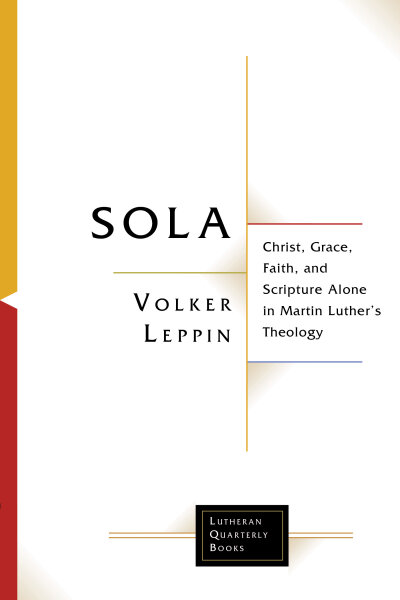The great "solas" of Reformation theology have taken on a life of their own, but to be more than slogans they have always needed explication and contextualization. With Volker Leppin's usual combination of erudition and boldness, his new book does just that, both setting out the complex origins of these simple slogans and showing us the richness of the theological and devotional context in which Luther works his way toward them. Again, Leppin shows us a lively, active, creative Luther pushing forward to a deeper and more powerful understanding of God's Word made flesh as the heart of Christian faith.
Leppin explores the four "solas" of Reformation theology--Christ, grace, faith, and scripture--as both anchored in the culture of late-medieval devotion and representing new, firmly demarcated formulae. Luther's four pillars became clarion calls in the fight against the medieval church. Leppin helps readers understand, however, that in the journey toward these new theological understandings, continuity and discontinuity were inextricably linked. Luther built upon the foundations of his late-medieval world, even as he articulated the sola Christus, sola gratia, sola fide, and sola scriptura foundations that would change Christianity forever. Along the way, these principles functioned as integrative, continuous ideas and exclusive, demarcating ones at the same time.
Luther's world was a new and fundamentally different theological realm, but Sola: Christ, Grace, Faith, and Scripture Alone in Martin Luther's Theology also shows us the ways Luther and his thought were products of the personalities and intellectual origins from which they came.
- Publisher Fortress Press
- Format Paperback
- ISBN 9781506491882
- eBook ISBN 9781506491899
- Dimensions 6 x 9
- Pages 228
- Publication Date May 14, 2024
Endorsements
Dr. R. Guy Erwin, president and Ministerium of Pennsylvania Professor of Reformation Studies, United Lutheran Seminary in Gettysburg and Philadelphia; former bishop of Southwest California Synod, Evangelical Lutheran Church in America
Volker Leppin's careful scholarship on Luther's theology is full of historical insight and ecumenical promise, but until now it has largely been available only to German readers. Thankfully, with Sola, Leppin's nuanced approach to Luther's thought is introduced to the broader English-speaking world. The Luther that emerges from Leppin's attentive analysis is one deeply embedded in the mystical-monastic theology of his late-medieval context. As such, his thought develops and maintains these broader continuities even as it transforms them into a potent evangelical theology. A welcome and necessary work for all serious students of the Reformation.
Dr. Erik H. Herrmann, author of The Babylonian Captivity of the Church, 1520: The Annotated Luther Study Edition
In a historical moment of social polarization and division, Sola takes on the conceptual monoliths that define Protestant identity and continue to construct a polemical thought-world that separates "us" (Protestants) from "them" (Roman Catholics): sola gratia, sola fides, sola Christi, and sola scriptura. With the incisive historical and theological analysis that we've come to expect from Volker Leppin, he shows that these so-called "principles" of the Reformation are actually "vessels for content from the Middle Ages." They demonstrate that Luther and the Wittenberg reformers were engaging theological movements taking shape across Europe in the preceding centuries; the "solas" developed slowly as both distinctive flavors of the emerging Reformation theology and its intended contributions back into those medieval traditions. In this regard, Leppin shows that the "solas" do not define Protestants as intrinsically different than Catholics, but rather point to our "common stock" and reinforce current ecumenical impulses that seek to overcome divide and bring formerly opposing sides back to a common table.
Dr. Candace L. Kohli, assistant professor of Lutheran systematic theology and global Lutheranism, Lutheran School of Theology at Chicago
Leppin's firm command of vital strands of medieval thinking, in both the scholastic and the monastic-mystical traditions, enables him to present effectively how Luther, deeply embedded in these traditions, came to his new understanding of the biblical faith while continuing to use the terminology and insights of several late-medieval theologians. Leppin's careful assessment of key texts, within the context of Luther's time and the framework of recent historical discussions, illuminates the reformer's development of his own agenda and basis for Christian theology.
Dr. Robert Kolb, professor emeritus of systematic theology, Concordia Seminary, St. Louis
The famous "sola" formulas of the Reformation are often used as if they were totally new. Grounded in his expertise in late-medieval thinking and piety, Leppin convincingly shows their historical roots, and how they developed and reached their distinctive profile.
Prof. Dr. Christiane Tietz, University of Zurich; author of Karl Barth: A Life in Conflict
Through this dense book on the Reformation "sola" principles, written into his new American context and presenting works from the years around the Jubilee of 2017, one gets a clear notion of the golden thread in Volker Leppin's yearslong and significant scholarship on Martin Luther. Leppin still pursues his "old experiment" of reading Luther as a medieval human being: it is the Luther of differences and transformations within history, not of opposition to and break from his own time. The book is historical, but it also has a strong and thought-provoking contemporary ecumenical agenda: read it and ponder upon it!
Dr. Anna Vind, associate professor, University of Copenhagen
